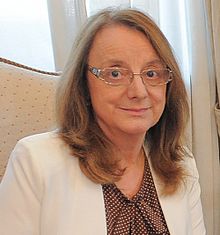Alicia Kirchner
| Alicia Kirchner | |
|---|---|
 |
|
| Governor of Santa Cruz | |
|
Assumed office 10 December 2015 |
|
| Preceded by | Daniel Román Peralta |
| Minister of Social Development of Argentina | |
|
In office 14 August 2006 – 9 December 2015 |
|
| President |
Néstor Kirchner Cristina Fernández de Kirchner |
| Preceded by | Juan Carlos Nadalich |
| Succeeded by | Carolina Stanley |
|
In office 25 May 2003 – 10 December 2005 |
|
| President | Néstor Kirchner |
| Preceded by | Daniel Sartor |
| Succeeded by | Juan Carlos Nadalich |
| Senator for Santa Cruz |
|
|
In office 10 December 2005 – 14 August 2006 |
|
| Personal details | |
| Born |
18 July 1946 Río Gallegos, Santa Cruz, Argentina |
| Nationality | Argentina |
| Political party |
Justicialist Party Front for Victory |
| Spouse(s) | Elvio Macchia |
| Alma mater |
University of Buenos Aires National University of General San Martín |
Alicia Margarita Kirchner (born July 18, 1946) is an Argentine Justicialist Party politician. She is the elder sister of the late former President Néstor Kirchner and served in his government as Minister of Social Development, a role which she held under President Cristina Fernández de Kirchner, her sister-in-law, until the end of her presidential term on December 9, 2015. On December 10, 2015, she was sworn in as the governor of the Province of Santa Cruz.
Kirchner worked as a teacher and social worker, holding a PhD in social work. From 1975 to 1983 she served as a sub-secretary of social action in her native Santa Cruz Province. From 1987 to 1990 she was a minister in the municipality of Río Gallegos, leading on public health, education, culture, social action, recreation and sport. For a few months in 1990, and again between 1991 and 1995 she served as provincial minister for social affairs, under her brother who had been elected governor of Santa Cruz.
She resigned in 1995 to stand for Mayor of Río Gallegos but lost and worked in the Argentine Senate advising on education and family matters, returning to her ministerial position between 1997 and 2003.
In May 2003 Néstor Kirchner became President and appointed his sister to his cabinet in a similar position she had held under him at provincial level.
In December 2005, Kirchner was elected to the Argentine Senate as senator for Santa Cruz Province for the Front for Victory faction, replacing her sister-in-law Cristina Fernández de Kirchner who stood in Buenos Aires Province. From her senate seat in a few months she steered two important social development matters through the Senate and was widely seen as still holding great influence in the ministry. [1] However, in August 2006 she returned to her former position in the cabinet replacing Juan Carlos Nadalich, leaving her senate seat vacant during a leave of absence.
...
Wikipedia
